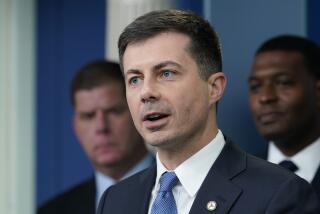U.S. to Take on Pilot Pensions
- Share via
The government’s pension agency Thursday moved to assume responsibility for United Airlines pilots’ pensions, acknowledging as unfortunate but inevitable the carrier’s elimination of defined-benefit plans for its employees.
The move will saddle the Pension Benefit Guaranty Corp. -- already operating at a $23-billion deficit -- with another huge financial burden. The agency estimated that it would be responsible for about $1.4 billion of the plan’s $2.9 billion in underfunded assets, making it the third-largest claim in the history of the insurance program.
Separately, United flight attendants voted overwhelmingly to authorize periodic strikes if the company carries out its threat to break their contract and impose new wage and benefit cuts.
The two sides remain in talks over a new contract, and no action will be taken until the matter is resolved in Bankruptcy Court. Hearings on United’s motion to terminate the existing contract are scheduled to begin Jan. 7 if no agreement has been reached.
“United flight attendants have spoken loudly and clearly,” said union leader Greg Davidowitch of the Assn. of Flight Attendants, announcing that 88% of members had approved taking strike actions. “They are ready to fight.”
United, a unit of Elk Grove Village, Ill.-based UAL Corp., said the actions contemplated by the union would be barred by both the Railway Labor Act and federal bankruptcy law.
“We regret that the AFA continues to take actions which are simply not helpful to United, its tens of thousands of employees or its customers,” spokeswoman Jean Medina said. “We remain committed to considering all workable options and alternatives that will still provide the long-lasting savings United needs to exit Chapter 11 successfully.”
Negotiations also continue between the nation’s No. 2 airline and unions representing mechanics, baggage handlers and public contact workers.
The pension agency will be taking over the pensions of more than 14,000 active and retired pilots, many of whose benefits will now be sharply reduced from what they were promised from the airline.
The agency already was facing the required takeover of United pension plans in 2005. By acting at year-end instead of in May, when the pilots’ pensions were to have been terminated, the agency said it could avoid the annual increase in mandated benefit payments and save as much as $140 million in additional payouts.
The action follows a tentative contract agreement between United and its pilots union this month, part of United’s effort to slash labor costs heavily for the second time in its two-year bankruptcy restructuring.
Facing $4.1 billion in required pension contributions by the end of 2008, United said this year that it would terminate all its existing employee pensions and replace them with much less expensive defined-contribution funds, similar to 401(k) plans.
The agency had objected to the tentative deal with pilots, who dropped their opposition to the pensions’ elimination in exchange for additional financial considerations. But it might have little recourse if the deal is approved in Bankruptcy Court.
“The decision to take over a pension plan is never made lightly, especially in situations where participants won’t get everything the company promised but failed to fund,” said Bradley Belt, the agency’s executive director.
The pilots union deplored what it called an “ill-timed attempt to retaliate” against it, and suggested that the move by the agency was an “outrageous ploy” designed to undermine the contract ratification vote underway among its members.
The Air Line Pilots Assn. “will vigorously oppose any effort by the PBGC to take over the plan before May 1, 2005, or to single out the pilot group for punitive and vindictive treatment in the United bankruptcy,” said a statement by the leaders of the union’s United branch.
Shares of UAL rose 14 cents to $1.37 in over-the-counter trading. UAL has been under Chapter 11 protection since December 2002.
More to Read
Inside the business of entertainment
The Wide Shot brings you news, analysis and insights on everything from streaming wars to production — and what it all means for the future.
You may occasionally receive promotional content from the Los Angeles Times.










